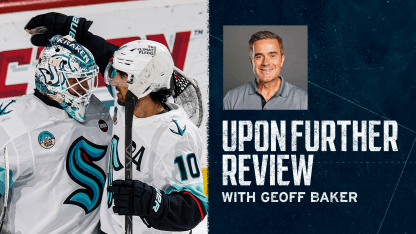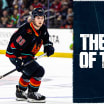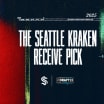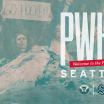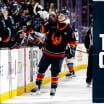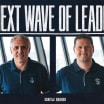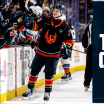There should be an abundant Kraken presence at next month’s IIHF Men’s World Hockey Championship, including two of our local players and a team equipment manager hoping to bring this country its first gold medal at the actual event in some 92 years.
Team USA on Thursday announced the first 18 players on its roster for the 16-nation tournament to be played May 9-25, primarily in Denmark but also in Sweden, with Kraken goalie Joey Daccord, center Matty Beniers, and equipment manager Jeff Camelio among those hoping for gold. And with Daccord and Beniers, perhaps they can channel some native Massachusetts energy between them to revive spirits from long past that previously prevailed for the U.S. at this tournament.
First, a quick primer on this country’s rather lackluster history throughout the 95 years of the worlds as a non-Olympic standalone event: The U.S. has only once won gold at an official world championship event and never when national squads played.
Technically, the Olympic champion from 1920-1968 was automatically crowned the world champion as well, meaning the U.S. got another title in 1960. But as for playing in and winning this tournament – which began playing as a separate event beyond the Olympics in 1930 -- that only happened once.
And that was way back in 1933, when amateur-level club teams often competed instead of national selection squads. In that case, a Massachusetts Rangers (aka Boston Olympics) team of mainly college players took gold by upsetting the Toronto National Sea Fleas from Canada, 2-1, in a non-sudden-death overtime period in Prague, Czechoslovakia.
Besides a rather cool sounding name, the favored Sea Fleas were coached by none other than infamous future Toronto Maple Leafs owner Harold Ballard, a man many still blame for that city’s 58-year Stanley Cup drought.
In fact, irritable Leafs fans will probably scoff and say: “Of course Harold Ballard managed to lose a world championship to the Americans.”
But regardless, the upstart Boston squad, forced to change to a Massachusetts Rangers name because of two New Yorkers on the roster, got their winning goal from onetime Harvard University star John Garrisson. He later pursued a business career over the NHL but continued to play internationally and won a bronze medal for Team USA at the 1936 Winter Olympics ahead of induction into the U.S. Hockey Hall of Fame.
So, perhaps there is a spiritual Massachusetts tie-in at-play here that could see Daccord or Beniers help swing things the U.S. way? You never know at this tournament, which has always been a bit of an oddball event – at least, for North Americans -- given it coincides with the Stanley Cup Playoffs.
That means a country’s rise-and-fall in the tourney can be determined by how many upsets there are in the NHL’s opening playoff rounds – freeing up the best players from the better teams to don their nation’s colors at the very last minute.
Canada has captured a record 28 gold medals, putting it one ahead of Russia’s 27, with last year’s winner, Czechia, a distant third at 13.
So, this isn’t exactly a “best-on-best” like what we just saw at the 4 Nations Face-Off in February or what we’ll have at next year’s Winter Olympics. But the competition is still rather high, which is why the Kraken are pleased some of their younger players and prospects should be competing for multiple nations.
And you should know, despite North Americans historically being a little ho-hum about it, European nations absolutely revere this tournament going back generations. Think about it: The NHL was mostly an all-Canadian affair with a few Americans and Scandinavians sprinkled in until the December 1991 collapse of the former Soviet Union that sparked a mass influx of players from all across Europe.
In other words, the NHL playoffs meant relatively little to overseas nations, but the world championship was indeed the biggest thing going outside of the Olympics. Those countries, especially the ones under communist regimes or influence, were sending stacked pro-type all-star rosters to this supposed amateur event and didn’t much care that the Canadian and American teams were often watered-down versions of their full-fledged selves.
Which is why Russia –– now banned from participating because of its invasion of Ukraine -- has so many gold medals. In Russia’s case, 22 of their 27 golds came prior to the Soviet Union’s breakup, including 12 titles out of a possible 13 from 1963 to 1975.
The Soviet Union began participating in the tournament in 1954, using permanent full-time players that were “amateur” in name only and played for pro-style teams and leagues back home.
That rankled the North American countries, particularly Canada, which had stopped sending club teams to represent it after winning gold in 1961 and began picking a national selection squad to better compete against the increasingly formidable Soviets and Czechoslovakia. But Canada and the U.S. continued to be prohibited from adding NHL or top minor pro players to their rosters – causing Canada to withdraw from the tournament altogether in 1970, complaining of a double-standard.
It was only in 1977 that pros were allowed, which prompted Canada’s return and the use of NHL players whose teams were already out of the playoffs. But the Soviets still dominated, and it wasn’t until 1994 that Canada finally won its first gold medal under the national team format.
Czechoslovakia was right behind the Soviets that prior era, taking six gold and 12 silver when it was still comprised of what’s now Czechia and Slovakia instead of competing as the separate nations they are today.
During the two decades between 1963 and 1983, the Soviet Union and Czechoslovakia finished Nos. 1 and 2 a total of 12 times.
And given the geopolitical situation, punctuated by a Soviet-led invasion of Czechoslovakia in 1968, you’d best believe those were tension-packed games between them. A pair of 1969 world championship contests, both won by Czechoslovakia, became known as the most emotionally charged in international hockey history.
So, yeah, that helps further explain why this tournament has meant a whole lot of big things to many people even if North America wasn’t always sending its best.
The U.S., meanwhile, has often been accused of not taking the tournament seriously and has previously sent younger prospects and collegians even when NHL stars were available. That’s changed of late as the U.S. becomes a global hockey power, evidenced by recent World Junior Hockey gold medals and its overtime loss to Canada at the 4 Nations Face-Off final. The tournament itself has also become far more balanced, with all countries now facing the same restrictions on players bound to NHL playoff teams.
With a growing American presence within the NHL’s elite ranks and three recent bronze medals in 2015, 2018 and 2021, there’s a feeling this year’s tournament might finally end the U.S. world championship drought. And if it does, Beniers and Daccord would be the latest Massachusetts boys to help put this country on the world championship map with arguably its biggest hockey triumph outside the Olympic golds in 1960 and 1980. Ahead of both players returning to Seattle with a renewed sense of what it will take to carry the Kraken to a higher level as well.

